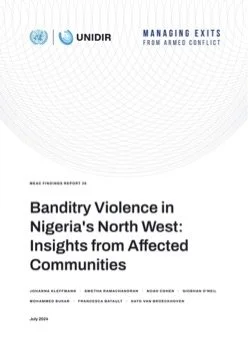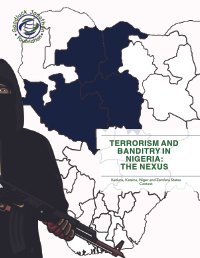By Johanna Kleffmann, Swetha Ramachandran, Noah Cohen, Siobhan O'Neil, Mohammed Bukar, Francesca Batault, Kato Van Broeckhoven,
Key Findings • The labelling of banditry as “organized crime,” “unknown gunmen,” or, more lately, “terrorists” has distorted this multi-faceted and still poorly understood phenomenon. Likewise, some of the frames that have been applied to banditry – particularly the farmer/herder conflict or Hausa/Fulani tensions – do not appear to fully align with local communities’ understandings of today’s evolution of banditry. Simplistic categorization and narrow lenses for understanding banditry may contribute to inappropriate or insufficient policy and programmatic responses. MEAC’s survey unearths some of the lived experiences with bandits and sheds light on the nuances of the phenomenon and its profound impact on communities. • Community perceptions of bandit groups corroborate earlier research depicting them as comprised of largely distinct, organized groups, albeit with shifting configurations and subject to fragmentation. Bandit groups operate in highly mobile, armed, and largely forestbased units that use quick-strike attacks on motorbikes against communities. Their motivations are primarily perceived as economic/financial by victims, including the notable subsection of the sample of Fulanis who have been victimized by bandits. • For the surveyed communities, weapons are the most recognizable feature of bandit groups. This bears critical implications for the potential for escalation of violence, further proliferation of illicit arms and ammunition including in the neighbouring regions, community violence reduction efforts and future DDR programming. • Victimisation experiences differ considerably with gender, age, and location in the North West. While physical violence and killings disproportionately affect adult men, sexual violence appears to especially affect women and girls (although it likely remains underreported). Variations of victimization across states indicate the volatile and dynamic nature of overall banditry presence and violence. • Banditry violence has profound and pervasive effects on the physical safety, access to income-generating activities, education, and mobility of residents in the northwestern communities surveyed. The perceived intensity and frequency of attacks are on the rise, with one in three respondents reporting experiencing weekly attacks in recent years. Close to two-thirds of respondents have family members who have been attacked by bandits.
Findings Report 36,
Geneva, The United Nations Institute for Disarmament Research ., UNIDIR, 2024,43p.




